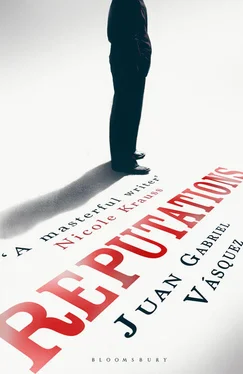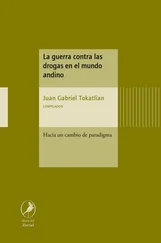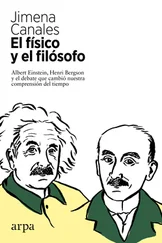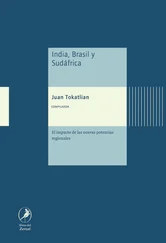He looked around, beyond Magdalena’s luminous face, and to his left, beyond the glass wall that separated the patio from the interior, and to his right, across the courtyard, towards the museum entrance. Two, three, four couples: how many would be splitting up right now? How many would be splitting up even without knowing it, heading slowly for disintegration? In the courtyard, a little boy in shorts was running after a minuscule bouncing ball. The ball was rolling towards the storm drains; the boy shouted, calling for help. And Samanta Leal? He hadn’t asked her if she was married, if she had children, someone with whom to share the suffering or at least disperse it. She was the same age as Beatriz, the same thirty-five years they’d both had in which to achieve so many things. That’s what Mallarino was thinking when someone from one of the nearby tables, a man who’d been eating on the other side of the glass, looked him in the eyes and stood up (his hands folding the napkin) and began to walk towards the open door. He waited until he was beside the table before speaking; when he did, Mallarino found the contrast between his size — and the size of the hand he extended in greeting — and his obsequious manner startling. ‘You are Javier Mallarino,’ he said, halfway between a statement and an enquiry.
Magdalena looked up. Her fork remained suspended in the air. Mallarino nodded. He shook the outstretched hand.
‘Thank you for your work,’ the man said. ‘I admire you, sir. I, uh, admire you very much.’
‘How the world has changed,’ said Magdalena when the man had gone back to his chair on the other side of the glass. The scene had visibly amused her: she spoke with irony, but also with flagrant satisfaction at the corner of her mouth, turned up in her ironic smile. ‘This is something I’ve never witnessed. Since when do such things happen to you?’
‘Since today,’ said Mallarino. ‘Or since yesterday. But I didn’t come into town yesterday.’
‘Can it be that people still read newspapers?’
‘I suppose so.’
‘You could have done your Titanic pose,’ said Magdalena. ‘Given your fans a treat.’
Mallarino smiled down at his plate. ‘Don’t take the piss.’
He shifted in his chair, turning to one side and pressing his back against the cool aluminium, as if trying to get a better view of the place. Magdalena asked him if his hernia was bothering him, if he wanted them to get the bill and walk around for a while, and only then did he realize that yes, his hernia was bothering him (a dull ache in his tailbone, his left leg already uncomfortable). Magdalena knew. How pleasant that was, and how surprising to notice the persistence of the past, the stubborn presence between them of the years of their marriage. They knew each other well, but it wasn’t just that: it was, undoubtedly, having met so young, having started living together and gone through the first disappointments and then the long march of learning (and now they’d learned, but it was too late to apply the lessons). All that was still present, another guest at the table, and that’s what they owed the comfort to, the relaxed way Magdalena set her cutlery down together on the empty plate and, just as he’d done earlier, leaned back silently in her chair. Why had her second marriage failed? Nine years after leaving Mallarino, Magdalena had married an easy-going commercial lawyer, and anybody would have thought — second chances are easier to make the most of — that the relationship was definitive. It was not: Mallarino found out vaguely about it from the rumour mill and, once, from the ‘Pink Telephone’ section of El Tiempo that also carried a rumour about Pablo Escobar’s possible surrender. (In one of his cartoons of the time, Mallarino drew Escobar alongside the victims of his most recent terrorist attack. On one side of the box appears the priest Rafael García Herreros, wearing his cassock, and saying: ‘Don’t worry, my son. I know you’re basically a good man.’) Magdalena’s marriage ended in eighteen months; Mallarino never tried to find out why. Now he could. Did he want to? Now he could. A heavy cloud darkened the patio; Mallarino felt a chilly breeze and the pores of his skin closing up all of a sudden. Magdalena clenched her fists above her chest and raised her shoulders, and Mallarino had the unmistakable feeling, as concrete as a tug in the vertebrae, that it was getting late. That’s what he said to himself: I’m running out of time , or rather those words lit up his mind. He immediately realized, with some amazement, that he was not thinking about the hours of the day.
‘Come and live with me,’ he said.
She stood up as if she’d been expecting the request (there was no surprise on her face, or was Mallarino reading it wrong). Tidy girl that she was, she pushed the chair to tuck it under the table, and the legs made an irritating metallic sound against the cement floor.
‘Let’s go,’ she replied. ‘I have to get back to the studio.’
They walked down a corridor to the main courtyard. They crossed it, passing beside the stone fountain that was distractedly spitting out a squalid little stream. Mallarino managed to catch a glimpse of Lucian Freud’s Blond Girl , which he liked so much, but he immediately looked away, in case he accidentally caught sight of the study for The Guitar Lesson . When they came out on Eleventh Street, the sky had clouded over and the shadows had disappeared from the walls, and small groups of students were gathering on the steps of the library. They went down Seventh and turned north. Magdalena had taken Mallarino’s arm. ‘What do you think?’ he asked. ‘Isn’t it a good idea?’
It wasn’t easy to walk on that crowded pavement whose traffic obliged them to make themselves small, to turn side-on so another pedestrian could get past with her briefcase, or his bag of vegetables, or a child dragged by the hand and forced to walk on tiptoe. ‘I had hoped, my dear,’ said Magdalena, ‘that it wouldn’t occur to you.’
They were passing in front of the marble plaques on the Augustín Nieto building, and Mallarino noticed a guy with long white hair who was copying the inscriptions, by hand, onto the pages of a notebook, or something that looked like a notebook; the guy was visible even from the other side of the street, for there, in the midst of the perilous crowds, his was the only figure keeping still.
‘I can’t do that, Javier,’ said Magdalena. ‘I can’t now. A lot of time has passed, and I have a life without you, and it’s a life I enjoy. I enjoyed the other night too, of course, I enjoyed it a lot. But I like my life the way it is. It has taken me years to get it together and I like it the way it is. I like solitude, Javier. At this stage in life I’ve discovered that I like my solitude. Beatriz hasn’t discovered it yet, but I think I can teach her. It would be a good gift, to teach my daughter how to be alone, to enjoy her solitude. I enjoy my solitude. You can understand that, I imagine. I think you can understand, can’t you? I think it’s too late now.’ Mallarino was not surprised that she used those words, almost the same he’d used to himself a few minutes earlier. ‘It’s never really too late, of course, it depends on the person. But what you’re proposing is not for me, it’s not for us,’ said Magdalena. ‘We don’t have time for this any more.’
From the other side of Jiménez Avenue, at the end of the oppressive windowless wall of the Banco de la República building, began the Parque Santander. Later, remembering this moment, Mallarino would wonder if that was when he thought of the day Ricardo Rendón died. It’s possible, he’d tell himself later, that he hadn’t been conscious of it at that moment, for his attention was on the agreeable pressure of Magdalena’s arm on his arm, on the scent of her hair, on the voice able to say, with that unpredictable sweetness, those things that pierced him to the marrow: ‘I had hoped that it wouldn’t occur to you,’ for example, or also this other one: ‘We don’t have time for this any more.’ But it had to be then, he would think, because it was just after pronouncing those words, there where you can see the sunshades of the shoeshine stands, that he stopped in the middle of the pavement and, without marvelling at the miracle, remembered once more those events he knew by heart although he’d never witnessed them.
Читать дальше












